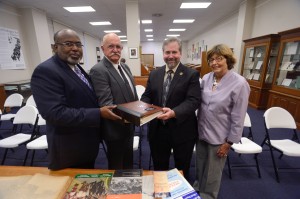Fifty years ago, as a young U.S. deputy marshal in his 20s, Herschel Garner was sent to Oxford to protect James Meredith’s right to enroll at the University of Mississippi.
“Ole Miss was not nearly as nice and welcoming in 1962 as it is today,” Garner said. “It’s wonderful to be met with open arms and handshakes instead of bricks.”
Denzil N. Bud Staple, who was among the 127 marshals also deployed to Oxford that fall, nodded in agreement, recalling that he lost count of the number of rocks and bricks thrown at him on the night Meredith become the first black person to enroll at Ole Miss.
The marshals returned to Oxford to speak as part of UM’s 50th anniversary of integration commemoration. While on campus, they donated a memory book to the Department of Archives and Special Collections. The book contains documents related to the violent confrontation of Sept. 30 — which left two dead and 79 marshals plus several border patrol agents injured — as well as items from the university’s 40th anniversary of integration commemoration.
“The memory book is a big gift from a very important part of the university’s history,” said Jennifer Ford, head of archives and special collections. “It gives the perspective of the brave marshals that were here that night and following that day. This gift shows their commitment to our history.”
The book contains maps, photographs, codes and a letter dated October 1962 that details the number of injuries.
By most accounts, the afternoon of Sept. 30 began quietly, with students asking a few questions, said U.S. Marshal historian Dave Turk. But by 7 p.m., the crowd grew loud and violent as people from as far away as California joined locals and began hurling racial insults and later throwing rocks, bricks, battery acid and Molotov cocktails.
“But the marshals were ordered not to fire weapons,” he said. “Their job was to see that Meredith was safely admitted to school among a crowd that grew more and more violent as the night passed. If it were not for their training, it would have been a massacre.”
Because the crowd was not adequately restrained by state authorities, the marshals received permission to use tear gas.
The use of tear gas “gained us a little space from the crowd, but only for brief periods,” Staple said. “We were still restricted from using firearms, so basically we were standing targets when the gunfire started.”
A bullet struck Ray Gunter, 23, of Oxford in the head. He died, and authorities never discovered who fired the shot. Paul Guihard, a French journalist, was shot and killed at almost point-blank range by an unknown assailant.
Kirk Bowden, one of a few black U.S. deputy marshals in 1962, said he was only 26 years old when he was dispatched to Oxford in late November or December.
“Many may not realize there were black deputy marshals here back then,” Bowden said. “And I can tell you Oxford was not a pleasant place for federal law enforcement officers of any race, but rioters definitely vented a lot of their anger on us black marshals. As soon as I stepped foot on campus, I thought, ‘Lord, what have I gotten myself into?’”
The Kennedy administration did not send black marshals to Oxford in September or October, fearing that their presence would further inflame the crowds opposed to the integration, Turk said.
Once Meredith was enrolled, Bowden and seven other black marshals were assigned to his security detail on campus.
“At the time, I was wondering why a veteran, a taxpayer, needed protection to attend a state university,” he said. “It didn’t take me long to discover the answer to my unspoken question. The death threats came daily. The racial slurs too, and I can’t forget the rocks and stones thrown out of cars and windows when Meredith walked to and from classes.
“I know Meredith doesn’t think he’s a hero, but what else do you call someone who stood up to right a wrong? He fought the system and paid a price for freedom.”
